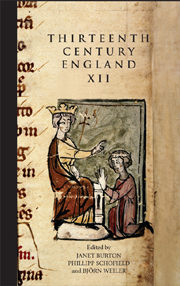Book contents
- Frontmatter
- Contents
- PREFACE
- LIST OF CONTRIBUTORS
- LIST OF ABBREVIATIONS
- The English and the Welsh in Fouke le Fitz Waryn
- Royal Piety in Thirteenth-century Scotland: The Religion and Religiosity of Alexander II (1214–49) and Alexander III (1249–86)
- The 1213 Pipe Roll and Exchequer Authority at the End of John's Reign
- The Public Debate during the Baronial Rebellion
- Richard of Cornwall and the Baronial Opposition in 1263
- Les liens personnels entre les cours de France et d'Angleterre sous le règne de Philippe III, 1270–85
- The Lay Opposition to Edward I in 1297: Its Composition and Character
- Peacekeepers and Lawbreakers in London, 1276–1321
- ‘The peace less kept’? The Origins, Revelations and Impact of Edward I's ‘Trailbaston’ Commissions of 1305–7
- Notes and Documents
- Knightly Society and the Augustinian Canons in the North-west of England
- A Year in the Life of a Royal Justice. Gilbert de Preston's Itinerary, July 1264–June 1265
- Living with Father's Reputation: The Careers of Two Thirteenth-century Oxfordshire Knights of Alien Origin, Thomas de Bréauté and Hugh de Plessis
- The Charters of Richard of Cornwall for the Empire
The Charters of Richard of Cornwall for the Empire
from Notes and Documents
Published online by Cambridge University Press: 12 September 2012
- Frontmatter
- Contents
- PREFACE
- LIST OF CONTRIBUTORS
- LIST OF ABBREVIATIONS
- The English and the Welsh in Fouke le Fitz Waryn
- Royal Piety in Thirteenth-century Scotland: The Religion and Religiosity of Alexander II (1214–49) and Alexander III (1249–86)
- The 1213 Pipe Roll and Exchequer Authority at the End of John's Reign
- The Public Debate during the Baronial Rebellion
- Richard of Cornwall and the Baronial Opposition in 1263
- Les liens personnels entre les cours de France et d'Angleterre sous le règne de Philippe III, 1270–85
- The Lay Opposition to Edward I in 1297: Its Composition and Character
- Peacekeepers and Lawbreakers in London, 1276–1321
- ‘The peace less kept’? The Origins, Revelations and Impact of Edward I's ‘Trailbaston’ Commissions of 1305–7
- Notes and Documents
- Knightly Society and the Augustinian Canons in the North-west of England
- A Year in the Life of a Royal Justice. Gilbert de Preston's Itinerary, July 1264–June 1265
- Living with Father's Reputation: The Careers of Two Thirteenth-century Oxfordshire Knights of Alien Origin, Thomas de Bréauté and Hugh de Plessis
- The Charters of Richard of Cornwall for the Empire
Summary
This paper deals with a topic and a question that, while recognised as significant, has so far not been treated in a concentrated and focused fashion. We will not be concerned with Richard's biography and will certainly not offer a discussion of his role as Romanorum rex. Rather, we would like to offer a short survey of the evidential basis of charters and diplomas on which, ultimately, any historical treatment will have to build. This seems all the more worthwhile an undertaking, as neither Frank Lewis's – sadly still unpublished – MA dissertation of 1934, nor Denholm-Young's – still definitive – biography of Richard of 1947 tell us much about these issues. What follows, with its focus on diplomatics and on the chancery of Germany's English king, also touches little on the issues explored by Björn Weiler.
Volume V of the Regesta Imperii: Early Stauferns 1198–1272 contains nearly 200 records falling within the reign of Richard of Cornwall: these are listed as BF 5287 to BF 5482. The Internet edition lists 333 records for the same period. If we compare these figures with the surviving records of the other monarchs of this period, commonly termed an interregnum, that is, Wilhelm of Holland, Alfonso of Castile and Henry Raspe, we can initially and confidently assume brisk recording activities.
However, the difference of far more than a hundred documents between those cited by Böhmer/Ficker and those cited in the new Internet edition already calls for closer inspection.
- Type
- Chapter
- Information
- Thirteenth Century England XIIProceedings of the Gregynog Conference, 2007, pp. 183 - 192Publisher: Boydell & BrewerPrint publication year: 2009



